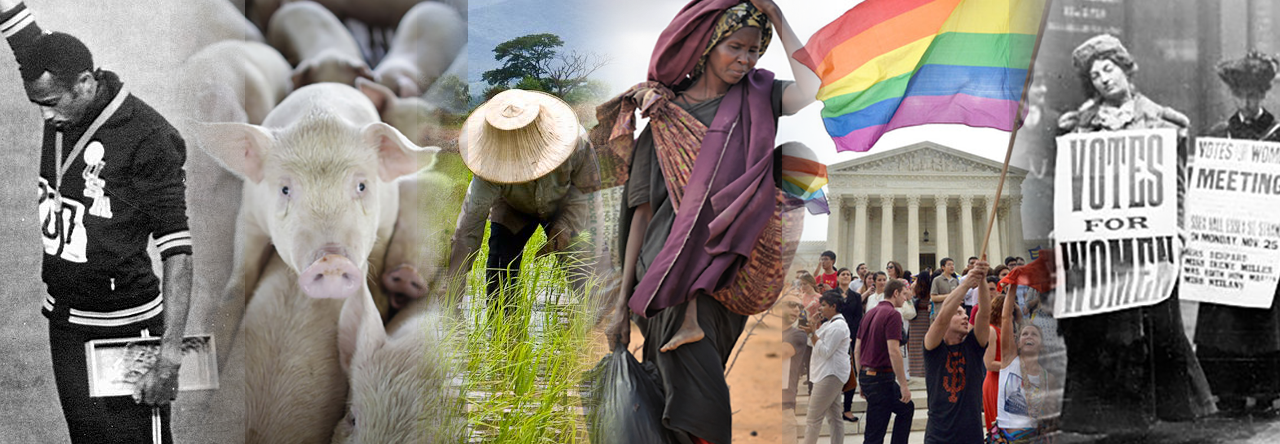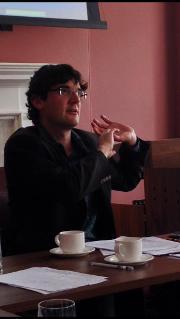On Monday evening, I talked to Philip Kitcher about his novel account of moral progress, which he developed in his Munich Lectures in Ethics. Those lectures have just been published by Oxford University Press, together with comments from Amia Srinivasan, Susan Neiman and Rahel Jaeggi. In the Munich Lectures, Kitcher takes up the “Deweyan project of making moral progress more systematic and sure-footed”. He seeks to gain a better understanding of what moral progress is by looking at cases from history. He then proposes a methodology for identifying morally problematic situations and coming up with justified solutions to those problems. It is a methodology for moral and ethical practice (not theory!), and it manifests the hope that human beings are able to attain moral progress – even with respect to the highly complex moral problems of our times. In our conversation, we talked about the open-endedness of the moral project, the collective nature of moral insight, the kinds of conversations that Kitcher believes are needed to deal with the moral problems that humanity is facing today, and the role of technology in the moral project.
Category: Democracy Page 3 of 12
Artificial intelligence (AI) and machine learning (ML) have seen impressive developments in the last decades. Think about Google’s DeepMind defeating Lee Sedol, the best human player of Go, with their program AlphaGo in 2015. The latest version, AlphaZero, is remarkable because it relied on deep reinforcement learning to learn how to play Go entirely by itself from scratch: with only the rules of the game, through trial and error, and playing millions of games against itself. Machine learning algorithms have a range of other practical applications, from image recognition in medical diagnostics to energy management.
Since the financial crisis of 2007, central banks have become the central tool of macroeconomic management, being described as the “only game in town.” To avert financial meltdown and, subsequently, to stimulate the economy, they have launched unconventional monetary policies such as quantitative easing (QE). The latter injects huge amounts of liquidity into the economy through large-scale purchases of financial assets by central banks. Central banks have doubled down on QE in reaction to the Covid-crisis.
QE has unintended side-effects. By pushing up the prices of the financial assets purchased, it favours already well-to-do asset holders. Given these consequences, central banks found themselves in the spotlight and pressured to justify their policies.
A well-known aphorism by George Santayana says that “those who cannot remember the past are condemned to repeat it”. Less well-known, though, is the sentence used to preface this aphorism, namely that “when experience is not retained […] infancy is perpetual”. While the former is often used to highlight the importance of learning from past mistakes, the latter underlines the importance of learning from the beneficial (albeit defunct) practices of the past. But can historical practices inform contemporary political philosophy? Anthoula Malkopoulou’s insightful analysis of the Athenian institution of ostracism suggests a positive response. On her view, we should understand ostracism as a mechanism of democratic self-defence, which could plausibly be revived in a modern version. In the following lines I will further explore this suggestion.
In this post, Baldwin Wong discusses their recent article in Journal of Applied Philosophy on how religious schools could participate in civic education.
Religious schools, such as the parochial schools affiliated with Christian churches, the cheder of Judaism, and the madrasas of Islam, are common in many democratic societies. These schools are usually established by private religious groups. Their environments are filled with religious symbols and celebrations that impact students’ learning experience. The content of education involves religious classics, theology, and the teaching of the virtues valued in each faith.
Political liberals have long been worried about the partiality of religious schools. They argue that these schools should be carefully regulated. Otherwise, their partial education may create “ethically servile children” who have an ignorant antipathy toward alternative viewpoints. I agree that religious schools should be regulated, but, in my recent article, I further suggest that some of these schools should be encouraged and subsidized because they are crucial in addressing a problem that a government cannot single-handedly resolve—the reconciliation between faith and justice.
In this post, Dick Timmer discusses their recent article in Journal of Applied Philosophy on why we should limit people’s wealth.
How we think about wealth has a profound impact on the world in which we live. Some years ago, philosopher Ingrid Robeyns proposed a new perspective on wealth, which she dubbed limitarianism. Robeyns argues that once people can live a fully flourishing life, additional wealth lacks moral value for the holder because it does not contribute their flourishing. And because such wealth threatens political equality, leaves many people’s urgent needs unmet, and could be used to address the current climate crisis, such wealth should be redistributed.
In my paper, I defend a version of this view. I argue that there are good political and ethical reasons to prevent people from having more than a certain amount of wealth. Above some point, wealth has little if any value for the holder, yet it could have huge value if redistributed.
 What is a good way to learn about political philosophy? Plausibly there is a variety of reasonable answers to this question, depending on what and why one wants to know about the subject, and it is some testament to this that there are excellent introductions that focus on the issues, concepts, and key thinkers in the field.
What is a good way to learn about political philosophy? Plausibly there is a variety of reasonable answers to this question, depending on what and why one wants to know about the subject, and it is some testament to this that there are excellent introductions that focus on the issues, concepts, and key thinkers in the field.
In our recent book – Introducing Political Philosophy: A Policy-Driven Approach – Will Abel, Elizabeth Kahn, Tom Parr, and I offer an approach that focuses on introducing the subject through the lens of public policy.
This is the first interview of this year from our Beyond the Ivory Tower series (you can read previous interviews here). Last October, Lisa Herzog spoke to Rowan Cruft about his public philosophy, and in particular his contribution to the Leveson Inquiry into the practices and ethics of the British media.
Rowan Cruft is a Professor in the Department of Philosophy at the University of Stirling. His research focuses on the nature and justification of rights. In 2012, he offered evidence to the Leveson Inquiry on the nature of ethical journalism and the public interest.
Lots of people in the United States (and elsewhere) are pessimistic about their ability to distinguish the truth from falsehoods. This is perhaps unsurprising given the relentless attack on truth that the United States experienced during the previous presidential administration.
As one observer recently put it: “There’s so much information that’s biased, that no one believes anything. There is so much out there and you don’t know what to believe, so it’s like there is nothing.”
Given all the uncertainty, polarization, and misinformation people have experience worldwide recently, this is an understandable reaction. Still, it’s troubling. It is hard for individuals or societies to function well without reliable access to truth.
No single solution will fix all of such epistemic challenges. Still, I think we can make meaningful progress by broadening our focus beyond just who or what to believe, to consider when we should believe.
Sometimes answering the question “When should I believe someone?” is enough to help dispel a fog of confusion. The reason why is rooted in common sense: people are more likely to be honest under some circumstances as opposed to others.
We have some exciting news to share: the first ever Justice Everywhere book is on its way. Entitled Political Philosophy in a Pandemic: Routes to a More Just Future, it will be published in print in September by Bloomsbury Academic (pre-order here). We are hoping that the e-book version will be out in the summer. Edited by Fay Niker and Aveek Bhattacharya, two of the convenors of the blog, the idea for the book developed out of the ‘Philosophers’ Rundown on the Coronavirus Crisis’ that we published here in April last year.
Political Philosophy in a Pandemic contains 20 essays on the moral and political implications of COVID-19 and the way governments have responded to it, arranged around five themes: social welfare, economic justice, democratic relations, speech and misinformation and the relationship between justice and crisis. Almost all of the contributors have featured on Justice Everywhere in recent years in form or another, either as authors or interviewees.




